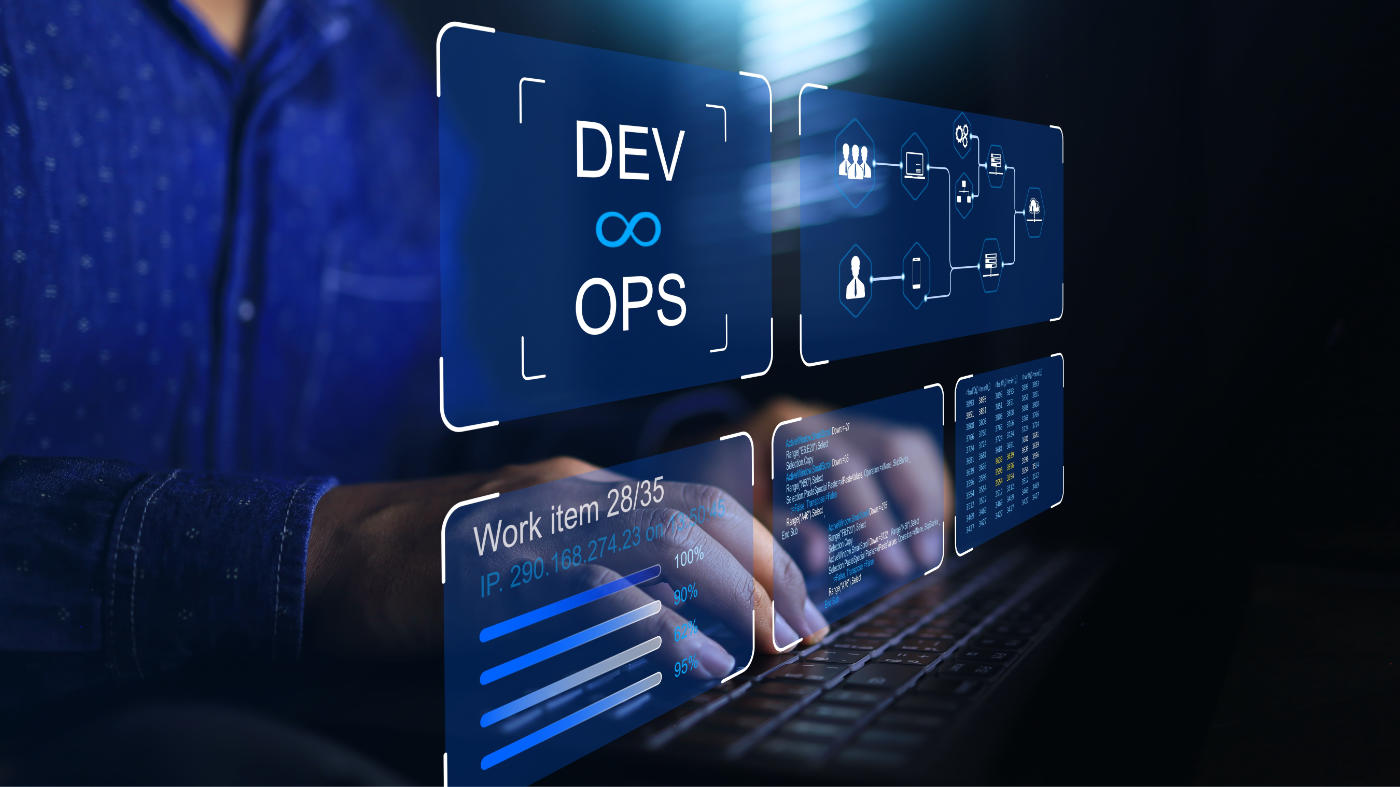DevOps Engineering Course

Your learning path to becoming a DevOps Engineer begins here
This course will prepare you for a career in DevOps, one of the fastest-growing fields in tech.
Our curriculum covers DevOps concepts in an easy-to-understand language. For 9 weeks, you’ll learn the principles of DevOps, Cloud Computing, DevOps Azure, continuous development and deployment, automation of configuration management, inter-team collaboration, and IT service agility using popular DevOps tools such as Git, Docker, Jenkins, Azure, and more. You will also be provided with hands-on examples of CI/CD tools to ensure that you interlink the business mindset and technology to improve efficiency in your Engineering teams.
DevOps focuses on better collaboration between the Development team and the Operations team. A DevOps Engineer is an individuals who oversee the entire software development lifecycle. They are instrumental in handling the code releases, implementing CI/CD pipeline, automating various processes, and solving any issues that arise during the development, deployment, or maintenance phase.
Our DevOps Engineering Online Course is ideal for those who want to fast-track their careers in Software Development. People working in the following roles will benefit the most from the DevOps Course:-
- Junior Web Developers
- Junior Software Engineers
- IT Specialists
- Software Developers
- Systems Administrators and IT Managers
- Cloud Engineers
- Data Engineers
- Huge demand for DevOps Experts – DevOps Engineers topped the list of LinkedIn’s Emerging Jobs and highest salary tech jobs due to their specialized skillset.
- Vulnerability Management – In Development Operations (DevOps), engineers build processes and streamline automation to optimize the software development lifecycle and protect against vulnerabilities.
- Process Improvements – DevOps Engineers use feedback, collaboration, ingenuity, and lean and agile methodologies to continuously improve all stages of software development.
- Favorable job opportunities – Most recently, companies are willing to adopt DevOps practices and tools to increase productivity and better Return on Investment (ROI). DevOps is getting increasingly popular, and more tech companies are hiring tech talent who know about DevOps.
- DevOps Engineer
- IT Systems Architect
- Automation Architect
- Release Manager
- DevOps Test Engineer
- DevOps Cloud Engineer
- DevOps Architect
- Cloud Security Specialist
Moringa is one of the most successful tech bootcamps in Africa. With a blended learning approach, we have trained top tech talent locally & globally.
- Practical hands-on learning
- Work on a portfolio of DevOps Engineering projects
- Live Lectures from a Senior DevOps Engineer with experience working in both local & global tech companies
- Dedicated Technical mentor support
- Recognized certificate upon completion of the course
- Access to a vast alumni network of Software Engineers, Data Scientists, Safaricom Digital Academy Alumni
DevOps Engineers help companies get more done at a faster pace by revolutionizing software development and deployment through the elimination of the conflicts between development and operations teams
Course Details
Find out the pacing options available, price, and more information about this course.
9 weeks
Part-time Classes
Live & Online | Mon – Fri from 6pm – 9pm (live lectures & Technical Mentor Support)
Ksh 55,000
Course Prerequisites
- All applicants must be 18 years and above and provide proof of ID/Passport
- Must have fundamental knowledge about core software development principles.
- Must have a basic understanding or proficiency with command-line tools and Linux operating system environments.
- You are required to complete a technical assessment test and score 70% at the end of your application.
- You are required to have a functional laptop with the following specs:- 8GB RAM, 500GB and above, Core i5 or i7.
- All classes are fully online. You are required to have access to stable internet.
- Be proficient in English and attend all classes.
DevOps Engineering Curriculum
For 9 weeks, you’ll learn the principles of DevOps, Cloud Computing, continuous development and deployment, automation of configuration management, inter-team collaboration, and IT service agility using popular DevOps tools such as Git, Docker, Jenkins, and more.
You will also be provided with hands-on examples on CI/CD tools to ensure that you interlink the business mindset and technology to improve efficiency in your Engineering teams.
Course Modules
Azure Cloud fundamentals & Azure Web Applications deployment (services)
- Core Concepts Of Azure
- Regions and availability zones (Cloud Resource Management)
- Azure Terminal (CLI and Portal) & Application Services (Plans)
- Configuring, scaling and logging applications on Azure Cloud
- Managing Images (creating docker files, Building Images, running containers)
- Develop , Test & Deploy an Azure Function
- Evaluate Azure services for integration and process automation scenarios
- How Azure Functions enable the creation of event-driven, compute-on-demand systems that can be triggered by various external events.
- Implement the publish-subscribe pattern in the cloud using Azure Queue storage
- Use Azure Service Bus topics and queues in a distributed architecture to ensure reliable communications
- Connect sending and receiving applications with Event Hubs so you can handle extremely high loads without losing data
- The basics of storage management in Azure and modeling
- Exploring Azure Storage Accounts (availability, models, types and tiers)
- Azure Blob Resource configuration (Blobs and containers)
- Azure NoSQL and Cosmos DB (Using Azure CLI to Provision)
- Managing Container Images in Azure Container Registry
- Managing Images in ACR Using the Docker CLI
- Creating Azure Container Instances (ACI)
- Azure Container Apps Architecture
- Creating and Managing ACA
- Configuring health probes and App secrets
- Learn how to create, configure, and manage virtual machines on Linux and Windows that host web apps
- Create and manage a virtual machine. Work with Windows virtual machines in Azure
- Build a run a web application with the MEAN stack
- Create and manage a Linux virtual machine
- Use Azure RBAC to manage access to resources in Azure
- Use access keys to secure networks
- Set up policies to protect cloud-based data (Conditional access)
- Secure web applications on Azure (MS Graph, Shared Access Signature (SAS
- Provisioning and configuring Web APIS [APIM], Networking
- Error handling in API anagement || Using advanced Policies
- Debug your APIs using request tracing
Develop message-based solutions
- Implement solutions that use Azure Service Bus
- Implement solutions that use Azure Queue Storage
- Provisioning Azure Relay
Integrating Caching and Content Delivery within Solutions
- Implementing Basic Operations with Cached Data
- Manipulating Data in Azure Cache from the Console
Monitoring and Evaluating
- Monitoring and Logging Solutions in Azure
- Analyzing Performance Issues with Azure Monitor
- Application insights
- Instrumenting Code to Use Application Insights
Career Opportunities in DevOps Engineering

As a DevOps engineer, you possess extensive knowledge of the software development life cycle (SDLC).
You will be responsible for implementing various automation tools and processes to resolve complex operations problems.

 Kenya
Kenya  International
International 